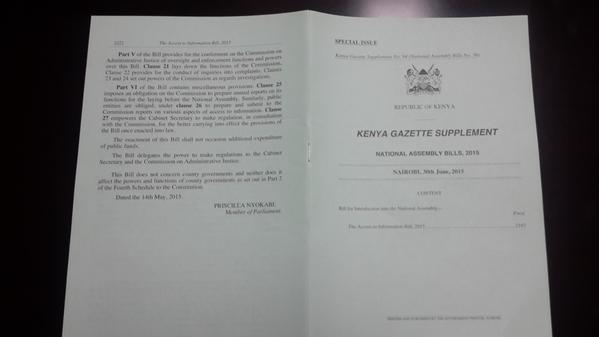Draft Access to Information Bill 2015 Published
- CIPIT |
- September 4, 2015 |
- CIPIT Insights

Recently, the Draft Access to Information Bill was finally published by the Government Printer. The Bill is sponsored by Priscilla Nyokabi, MP. A copy of the Bill is available here.
This Bill is an important part of Kenya’s efforts to establish itself as the leading ICT investment destination in East and Central Africa and ICT-enabled business is a key component of its national development agenda, Vision 2030. The use of technology for improved delivery of government services, increased productivity, a world-class business environment and dynamic domestic markets in goods and services that can serve regional and global expansion are major drivers in maintaining a sustained economic growth rate of at least 10% per year for the next decade.
Access to public information is a fundamental human right and a multi-dimensional tool serving both governments and citizens. It improves governance and lives as it assists public administration to become more transparent and accountable and enables citizens to engage more meaningfully in public life, understand policies, help determine public priorities, and use the information to ensure the exercise of their other human rights, including the rights to clean water, a safe environment, and education. The Constitution of Kenya provides for this right and the Access to Information Bill seeks to make further provisions on that right.
Public bodies have a duty to exercise open government.Kenya understands the value of open government data as it was the first developing to have an open government data portal, the first in sub-Saharan Africa and second on the continent after Morocco. Access to information is a public right that implicates public officials and institutions which carry out duties of a public nature. It is a right held by an individual and enforced against the state. The right does not extend to private information/information held by private entities as such information is protected by another fundamental human right – the right to privacy.
While data is the lifeblood of the new information society, it has increasingly become an important component of traditional business sectors, including trade, manufacturing and agriculture which continue to be important drivers of Kenya’s economy. Countries are establishing themselves as secure destinations for both ICT and traditional business models by providing appropriate legal frameworks for data protection.
Kenya has the right technological and economic foundations to benefit even more from data-driven innovation. Experience has shown that a balanced approach in regulating and managing data can help to spur data-driven innovation.
Part of this balance is in preserving the distinction between public data, to which the public is entitled to access, and private data, to which access is restricted and governed by the right to privacy, intellectual property, contractual obligations etc.
